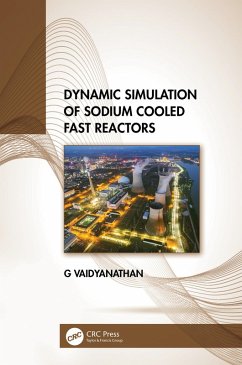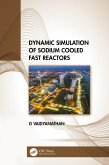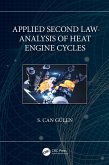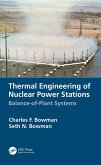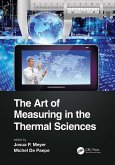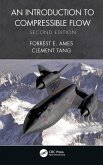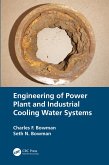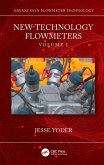G. Vaidyanathan
Dynamic Simulation of Sodium Cooled Fast Reactors (eBook, PDF)
51,95 €
51,95 €
inkl. MwSt.
Sofort per Download lieferbar

26 °P sammeln
51,95 €
Als Download kaufen

51,95 €
inkl. MwSt.
Sofort per Download lieferbar

26 °P sammeln
Jetzt verschenken
Alle Infos zum eBook verschenken
51,95 €
inkl. MwSt.
Sofort per Download lieferbar
Alle Infos zum eBook verschenken

26 °P sammeln
G. Vaidyanathan
Dynamic Simulation of Sodium Cooled Fast Reactors (eBook, PDF)
- Format: PDF
- Merkliste
- Auf die Merkliste
- Bewerten Bewerten
- Teilen
- Produkt teilen
- Produkterinnerung
- Produkterinnerung

Bitte loggen Sie sich zunächst in Ihr Kundenkonto ein oder registrieren Sie sich bei
bücher.de, um das eBook-Abo tolino select nutzen zu können.
Hier können Sie sich einloggen
Hier können Sie sich einloggen
Sie sind bereits eingeloggt. Klicken Sie auf 2. tolino select Abo, um fortzufahren.

Bitte loggen Sie sich zunächst in Ihr Kundenkonto ein oder registrieren Sie sich bei bücher.de, um das eBook-Abo tolino select nutzen zu können.
The text comprehensively discusses basis of mathematical modelling of the heat transfer process in a fast reactor cooled by sodium in a single volume. The text will be helpful for senior undergraduate, graduate students and academic researchers in the fields of nuclear engineering, mechanical engineering, and power cycle engineering.
- Geräte: PC
- ohne Kopierschutz
- eBook Hilfe
- Größe: 24.34MB
Andere Kunden interessierten sich auch für
![Dynamic Simulation of Sodium Cooled Fast Reactors (eBook, ePUB) Dynamic Simulation of Sodium Cooled Fast Reactors (eBook, ePUB)]() G. VaidyanathanDynamic Simulation of Sodium Cooled Fast Reactors (eBook, ePUB)51,95 €
G. VaidyanathanDynamic Simulation of Sodium Cooled Fast Reactors (eBook, ePUB)51,95 €![Applied Second Law Analysis of Heat Engine Cycles (eBook, PDF) Applied Second Law Analysis of Heat Engine Cycles (eBook, PDF)]() S. Can GülenApplied Second Law Analysis of Heat Engine Cycles (eBook, PDF)127,95 €
S. Can GülenApplied Second Law Analysis of Heat Engine Cycles (eBook, PDF)127,95 €![Thermal Engineering of Nuclear Power Stations (eBook, PDF) Thermal Engineering of Nuclear Power Stations (eBook, PDF)]() Charles F. BowmanThermal Engineering of Nuclear Power Stations (eBook, PDF)55,95 €
Charles F. BowmanThermal Engineering of Nuclear Power Stations (eBook, PDF)55,95 €![The Art of Measuring in the Thermal Sciences (eBook, PDF) The Art of Measuring in the Thermal Sciences (eBook, PDF)]() The Art of Measuring in the Thermal Sciences (eBook, PDF)136,95 €
The Art of Measuring in the Thermal Sciences (eBook, PDF)136,95 €![An Introduction to Compressible Flow (eBook, PDF) An Introduction to Compressible Flow (eBook, PDF)]() Forrest E. AmesAn Introduction to Compressible Flow (eBook, PDF)46,95 €
Forrest E. AmesAn Introduction to Compressible Flow (eBook, PDF)46,95 €![Engineering of Power Plant and Industrial Cooling Water Systems (eBook, PDF) Engineering of Power Plant and Industrial Cooling Water Systems (eBook, PDF)]() Charles F. BowmanEngineering of Power Plant and Industrial Cooling Water Systems (eBook, PDF)78,95 €
Charles F. BowmanEngineering of Power Plant and Industrial Cooling Water Systems (eBook, PDF)78,95 €![New-Technology Flowmeters (eBook, PDF) New-Technology Flowmeters (eBook, PDF)]() Jesse YoderNew-Technology Flowmeters (eBook, PDF)88,95 €
Jesse YoderNew-Technology Flowmeters (eBook, PDF)88,95 €-
-
-
The text comprehensively discusses basis of mathematical modelling of the heat transfer process in a fast reactor cooled by sodium in a single volume. The text will be helpful for senior undergraduate, graduate students and academic researchers in the fields of nuclear engineering, mechanical engineering, and power cycle engineering.
Dieser Download kann aus rechtlichen Gründen nur mit Rechnungsadresse in A, B, BG, CY, CZ, D, DK, EW, E, FIN, F, GR, HR, H, IRL, I, LT, L, LR, M, NL, PL, P, R, S, SLO, SK ausgeliefert werden.
Produktdetails
- Produktdetails
- Verlag: Taylor & Francis
- Seitenzahl: 272
- Erscheinungstermin: 18. November 2022
- Englisch
- ISBN-13: 9781000779547
- Artikelnr.: 65978596
- Verlag: Taylor & Francis
- Seitenzahl: 272
- Erscheinungstermin: 18. November 2022
- Englisch
- ISBN-13: 9781000779547
- Artikelnr.: 65978596
Dr G.Vaidyanathan, B.E., MBA, PhD served the Department of Atomic Energy, India over a period of 38 years until 2010. As a group director of the Fast Reactor Technology group at the Indira Gandhi Centre for Atomic Research (IGCAR), Kalpakkam, which is devoted to the development of Fast Reactors in India. He is a specialist in numerical and experimental thermal hydraulics and safety analysis. He was one of the key persons involved in the design and development of the experimental Fast Breeder Test Reactor (FBTR) and the Prototype Fast Breeder Reactor (PFBR) in India. He has contributed to the inhouse development of thermal hydraulic computer codes and during commissioning tests in FBTR the predictions of these codes were substantiated.
After 2010 Dr Vaidyanathan has been teaching nuclear energy and alternative systems in the Indian universities. He has brought out 4 books on nuclear energy. These books have been welcomed by many professors teaching nuclear subjects in in Indian and Foreign universities. He has developed a video module comprising of 30 lectures on nuclear reactors and safety under the NPTEL program of IIT & IISc and these have been extensively used.
Dr Vaidyanathan is a life fellow of the Institution of Engineers India, life member f the Indian nuclear society and Indian society of heat & mass transfer. He has 37 journal publications to his credit. He continues to contribute to the department as a member of the sodium safety panel (SSP) at IGCAR and the Advisory Committees for Safety review of various Projects (ACPSR) at the Atomic Energy Regulatory Board, India.
After 2010 Dr Vaidyanathan has been teaching nuclear energy and alternative systems in the Indian universities. He has brought out 4 books on nuclear energy. These books have been welcomed by many professors teaching nuclear subjects in in Indian and Foreign universities. He has developed a video module comprising of 30 lectures on nuclear reactors and safety under the NPTEL program of IIT & IISc and these have been extensively used.
Dr Vaidyanathan is a life fellow of the Institution of Engineers India, life member f the Indian nuclear society and Indian society of heat & mass transfer. He has 37 journal publications to his credit. He continues to contribute to the department as a member of the sodium safety panel (SSP) at IGCAR and the Advisory Committees for Safety review of various Projects (ACPSR) at the Atomic Energy Regulatory Board, India.
Chapter 1 Introduction
1.1 General
1.2 Basics of Breeding
1.3 Uranium Utilization
1.4 Components of Fast Reactors
1.5 Overview of Fast Reactor Programs
1.6 Need for Dynamic Simulation
1.7 Design Basis
1.8 Plant Protection System
1.9 Sensors and Response Time
1.10 Scope of Dynamic Studies
1.11 Modelling Development
References
Assignment
Chapter 2 Description of Fast Reactors
2.1 Introduction
2.2 Fast Breeder Test Reactor (FBTR)
2.2.1. Reactor Core
2.2.2 Reactor Assembly
2.2.3. Sodium Systems
2.2.4 Decay Heat Removal
2.2.5 Generating Plant
2.2.6 Instrumentation and Control
2.2.7 Safety
2.3 Prototype Fast Breeder Reactor
2.3.1 Reactor Core
2.3.2 Reactor Assembly
2.3.3 Main Heat Transport System
2.3.4 Steam Water System
2.3.5 Instrumentation and control
2.3.6 Safety
2.4 Neutronic Characteristics of FNRs
2.5 Thermal-Hydraulic Characteristics of FNR
References
Assignment
Chapter 3 Reactor Heat Transfer
3.1 Introduction
3.2 Reactor Core
3.2.1 Core Description
3.2.2 Fuel Pin
3.2.3 Subassembly
3.3 Coolant Selection
3.4 Control Material Selection
3.5 Structural Material Selection
3.6 Heat Generation
3.7 Reactivity Feedback
3.7.1 Doppler Effect
3.7.2 Sodium Density and Void Effects
3.7.3 Fuel Axial Expansion Effect
3.7.4 Structural Expansion
3.7.5 Bowing
3.8 Decay Heat
3.9 Solution Methods
3.9.1 Prompt Jump Approximation
3.9.2 Runge Kutta Method
3.9.3 Kaganove Method
3.9.4 Comparison of different Methods
3.9.5 Solution Methodology
3.10 Heat Transfer in Primary System
3.10.1 Core Thermal Model
3.10.2 Fuel Restructuring
3.10.3 Gap Conductance
3.10.4 Fuel Thermal Model
3.10.5 Solution Technique
3.11 Determination of Peak Temperatures: Hot Spot Analysis
3.12 Core Thermal Model validation in FBTR and SUPER PHENIX
3.13 Mixing of Coolant Streams in Upper Plenum
3.13.1 Solution Technique
3.14 Lower Plenum/Cold Pool
3.15 Grid Plate
3.16 Heat Transfer Correlations for Fuel Rod Bundle
References
Assignment
Chapter 4 IHX Thermal Model
4.1 Introduction
4.2 Experience in PHENIX
4.3 Thermal Model
4.4 Solution Techniques
4.4.1 Nodal Heat Balance Scheme
4.4.2 Finite Differencing Scheme
4.5 Choice of Numerical Scheme
4.5.1 Nodal Heat Balance for Unbalanced Flows
4.5.2 Modified Nodal Heat Balance Scheme (MNHB)
4.6 Heat Transfer Correlations
4.7 Validation
References
Assignment
Chapter 5 Thermal Model of Piping
5.1 Introduction
5.2 Thermal Model
5.3 Solution Methods
5.4 Comparison of Piping Models
References
Assignment
Chapter 6 Sodium Pump
6.1 Introduction
6.2 Electromagnetic Pumps
6.3 Centrifugal Pump
6.3.1 Pump Hydraulic Model
6.3.2 Pump Dynamic Model
6.3.3 Pump Thermal Model
References
Assignment
Chapter 7 Transient Hydraulics Simulation
7.1Introduction
7.2Momentum Equations
7.3Free Level Equations
7.4Core Coolant Flow Distribution
7.5IHX Pressure Drop Correlations
7.5.1 Resistance Coefficient for Cross Flow
7.5.2. Resistance Coefficient for Axial Flow
7.6 Pump Characteristics
7.7 Computational Model
7.8 Validation Studies
7.9 Secondary Circuit Hydraulics
7.9.1 Secondary Hydraulics Model
7.9.2 Natural Convection Flow in Sodium-Validation Studies
References
Assignment
Chapter 8 Steam Generator
8.1 Introduction
8.2 Heat Transfer Mechanisms
8.3 Steam Generator Designs
8.3.1. Conventional Fossil Fuelled Boilers
8.3.1.1 Drum Type
8.3.1.2 Once Through Steam Generators
8.3.2 Sodium Heated Steam Generators
8.4 Thermodynamic Models
8.5 Mathematical Model
8.6 Heat Transfer Correlations
8.6.1 Single Phase Liquid Region
8.6.2 Nucleate Boiling
8.6.3 Dry-Out
8.6.4 Post Dry-Out
8.6.5 Superheated Region
8.6.6 Sodium Side Heat Transfer
8.7 Pressure Drop
8.8 Computational Model
8.8.1Solution of Water /Steam Side Equations
8.8.2 Solution of Sodium, Shell, And Tube Wall Equations
8.9 Steam Generator Model Validation
References
Assignment
Chapter 9 Computer Code Development
9.1 Introduction
9.2 Organization of DYNAM
9.3 Axisymmetric Code STITH-2D
9.4 Comparison of Predictions of DYANA-P And DYANA-HM
References
Chapter 10 Specifying Sodium Pumps Coast-Down Time
10.1 Introduction
10.2 Impact of Coast Down Time in Loop Type FNR
10.3 Impact of Coast Down Time in Pool Type FNR
10.4 Considerations for Deciding Flow Coast Down Time
10.5 Scram Threshold Vs Coast Down Time
10.5.1. FHT Effect on Maximum Temperatures
10.5.2 FHT to Avoid Scram for Short Power Failure
10.6 Secondary pump FHT
10.7 Primary FHT for Unprotected Loss of Flow
References
Assignment
Chapter 11 Plant Protection System
11.1 Introduction
11.2 Limiting Safety System Settings for FBTR
11.2.1 Safety Signals and Settings
11.2.2 Limiting Safety System Adequacy for FBTR
11.3 Limiting Safety System Settings for PFBR
11.3.1 Design Basis Events
11.3.2 Core Design Safety Limits
11.3.3 Selection of Scram Parameters
11.4 Shutdown System
11.5 Event Analysis
References
Assignment
Chapter 12 Decay Heat Removal System
12.1 Introduction
12.2 Natural Convection Basics
12.3 DHR System Options in FNR
12.3.1 DHR in Primary Sodium
12.3.2 DHR in Secondary Sodium
12.3.3 Steam Generator Auxiliary Cooling System
12.3.4 DHR Through Steam-Water System
12.3.5 Reactor Vessel Auxiliary Cooling System
12.4 DHR in FBTR
12.4.1 Heat Removal By Air In SG Casing
12.4.2 Loss of Offsite and Onsite Power with SG Air Cooling
12.4.3 Loss Of Offsite And Onsite Power Without Reactor Trip
12.5 DHR in PFBR
12.5.1 Thermal Model
12.5.2 Decay Heat Exchanger (DHX) Model
12.5.3 Hot Pool Model
12.5.4 Air Heat Exchanger Model (AHX) Model
12.5.5 Piping
12.5.6 Expansion Tank
12.5.7 Air Stack/Chimney
12.5.8 Hydraulic Model
12.5.9 DHDYN Validation on SADHANA Loop
12.6 Role of Inter Wrapper Flow
12.7 Role of Secondary thermal capacity
References
Assignment
Chapter 13 Modelling of Large Sodium-Water Reaction
13.1 Introduction
13.2 Leak Rate
13.2.1 Water Leak Rate model
13.2.2 Steam leak rate model
13.3 Reaction site dynamics
13.3.1 Spherical bubble model
13.3.2 Columnar bubble model
13.3.3 Solution technique
13.3.4 Validation of Reaction site model
13.4 Sodium Side System Transient
13.5 Discharge Circuit System Transient
13.6 Analysis of Pressure Transients for PFBR
13.7 Failure of a greater number of tubes than design basis leak
References
Assignment
1.1 General
1.2 Basics of Breeding
1.3 Uranium Utilization
1.4 Components of Fast Reactors
1.5 Overview of Fast Reactor Programs
1.6 Need for Dynamic Simulation
1.7 Design Basis
1.8 Plant Protection System
1.9 Sensors and Response Time
1.10 Scope of Dynamic Studies
1.11 Modelling Development
References
Assignment
Chapter 2 Description of Fast Reactors
2.1 Introduction
2.2 Fast Breeder Test Reactor (FBTR)
2.2.1. Reactor Core
2.2.2 Reactor Assembly
2.2.3. Sodium Systems
2.2.4 Decay Heat Removal
2.2.5 Generating Plant
2.2.6 Instrumentation and Control
2.2.7 Safety
2.3 Prototype Fast Breeder Reactor
2.3.1 Reactor Core
2.3.2 Reactor Assembly
2.3.3 Main Heat Transport System
2.3.4 Steam Water System
2.3.5 Instrumentation and control
2.3.6 Safety
2.4 Neutronic Characteristics of FNRs
2.5 Thermal-Hydraulic Characteristics of FNR
References
Assignment
Chapter 3 Reactor Heat Transfer
3.1 Introduction
3.2 Reactor Core
3.2.1 Core Description
3.2.2 Fuel Pin
3.2.3 Subassembly
3.3 Coolant Selection
3.4 Control Material Selection
3.5 Structural Material Selection
3.6 Heat Generation
3.7 Reactivity Feedback
3.7.1 Doppler Effect
3.7.2 Sodium Density and Void Effects
3.7.3 Fuel Axial Expansion Effect
3.7.4 Structural Expansion
3.7.5 Bowing
3.8 Decay Heat
3.9 Solution Methods
3.9.1 Prompt Jump Approximation
3.9.2 Runge Kutta Method
3.9.3 Kaganove Method
3.9.4 Comparison of different Methods
3.9.5 Solution Methodology
3.10 Heat Transfer in Primary System
3.10.1 Core Thermal Model
3.10.2 Fuel Restructuring
3.10.3 Gap Conductance
3.10.4 Fuel Thermal Model
3.10.5 Solution Technique
3.11 Determination of Peak Temperatures: Hot Spot Analysis
3.12 Core Thermal Model validation in FBTR and SUPER PHENIX
3.13 Mixing of Coolant Streams in Upper Plenum
3.13.1 Solution Technique
3.14 Lower Plenum/Cold Pool
3.15 Grid Plate
3.16 Heat Transfer Correlations for Fuel Rod Bundle
References
Assignment
Chapter 4 IHX Thermal Model
4.1 Introduction
4.2 Experience in PHENIX
4.3 Thermal Model
4.4 Solution Techniques
4.4.1 Nodal Heat Balance Scheme
4.4.2 Finite Differencing Scheme
4.5 Choice of Numerical Scheme
4.5.1 Nodal Heat Balance for Unbalanced Flows
4.5.2 Modified Nodal Heat Balance Scheme (MNHB)
4.6 Heat Transfer Correlations
4.7 Validation
References
Assignment
Chapter 5 Thermal Model of Piping
5.1 Introduction
5.2 Thermal Model
5.3 Solution Methods
5.4 Comparison of Piping Models
References
Assignment
Chapter 6 Sodium Pump
6.1 Introduction
6.2 Electromagnetic Pumps
6.3 Centrifugal Pump
6.3.1 Pump Hydraulic Model
6.3.2 Pump Dynamic Model
6.3.3 Pump Thermal Model
References
Assignment
Chapter 7 Transient Hydraulics Simulation
7.1Introduction
7.2Momentum Equations
7.3Free Level Equations
7.4Core Coolant Flow Distribution
7.5IHX Pressure Drop Correlations
7.5.1 Resistance Coefficient for Cross Flow
7.5.2. Resistance Coefficient for Axial Flow
7.6 Pump Characteristics
7.7 Computational Model
7.8 Validation Studies
7.9 Secondary Circuit Hydraulics
7.9.1 Secondary Hydraulics Model
7.9.2 Natural Convection Flow in Sodium-Validation Studies
References
Assignment
Chapter 8 Steam Generator
8.1 Introduction
8.2 Heat Transfer Mechanisms
8.3 Steam Generator Designs
8.3.1. Conventional Fossil Fuelled Boilers
8.3.1.1 Drum Type
8.3.1.2 Once Through Steam Generators
8.3.2 Sodium Heated Steam Generators
8.4 Thermodynamic Models
8.5 Mathematical Model
8.6 Heat Transfer Correlations
8.6.1 Single Phase Liquid Region
8.6.2 Nucleate Boiling
8.6.3 Dry-Out
8.6.4 Post Dry-Out
8.6.5 Superheated Region
8.6.6 Sodium Side Heat Transfer
8.7 Pressure Drop
8.8 Computational Model
8.8.1Solution of Water /Steam Side Equations
8.8.2 Solution of Sodium, Shell, And Tube Wall Equations
8.9 Steam Generator Model Validation
References
Assignment
Chapter 9 Computer Code Development
9.1 Introduction
9.2 Organization of DYNAM
9.3 Axisymmetric Code STITH-2D
9.4 Comparison of Predictions of DYANA-P And DYANA-HM
References
Chapter 10 Specifying Sodium Pumps Coast-Down Time
10.1 Introduction
10.2 Impact of Coast Down Time in Loop Type FNR
10.3 Impact of Coast Down Time in Pool Type FNR
10.4 Considerations for Deciding Flow Coast Down Time
10.5 Scram Threshold Vs Coast Down Time
10.5.1. FHT Effect on Maximum Temperatures
10.5.2 FHT to Avoid Scram for Short Power Failure
10.6 Secondary pump FHT
10.7 Primary FHT for Unprotected Loss of Flow
References
Assignment
Chapter 11 Plant Protection System
11.1 Introduction
11.2 Limiting Safety System Settings for FBTR
11.2.1 Safety Signals and Settings
11.2.2 Limiting Safety System Adequacy for FBTR
11.3 Limiting Safety System Settings for PFBR
11.3.1 Design Basis Events
11.3.2 Core Design Safety Limits
11.3.3 Selection of Scram Parameters
11.4 Shutdown System
11.5 Event Analysis
References
Assignment
Chapter 12 Decay Heat Removal System
12.1 Introduction
12.2 Natural Convection Basics
12.3 DHR System Options in FNR
12.3.1 DHR in Primary Sodium
12.3.2 DHR in Secondary Sodium
12.3.3 Steam Generator Auxiliary Cooling System
12.3.4 DHR Through Steam-Water System
12.3.5 Reactor Vessel Auxiliary Cooling System
12.4 DHR in FBTR
12.4.1 Heat Removal By Air In SG Casing
12.4.2 Loss of Offsite and Onsite Power with SG Air Cooling
12.4.3 Loss Of Offsite And Onsite Power Without Reactor Trip
12.5 DHR in PFBR
12.5.1 Thermal Model
12.5.2 Decay Heat Exchanger (DHX) Model
12.5.3 Hot Pool Model
12.5.4 Air Heat Exchanger Model (AHX) Model
12.5.5 Piping
12.5.6 Expansion Tank
12.5.7 Air Stack/Chimney
12.5.8 Hydraulic Model
12.5.9 DHDYN Validation on SADHANA Loop
12.6 Role of Inter Wrapper Flow
12.7 Role of Secondary thermal capacity
References
Assignment
Chapter 13 Modelling of Large Sodium-Water Reaction
13.1 Introduction
13.2 Leak Rate
13.2.1 Water Leak Rate model
13.2.2 Steam leak rate model
13.3 Reaction site dynamics
13.3.1 Spherical bubble model
13.3.2 Columnar bubble model
13.3.3 Solution technique
13.3.4 Validation of Reaction site model
13.4 Sodium Side System Transient
13.5 Discharge Circuit System Transient
13.6 Analysis of Pressure Transients for PFBR
13.7 Failure of a greater number of tubes than design basis leak
References
Assignment
Chapter 1 Introduction
1.1 General
1.2 Basics of Breeding
1.3 Uranium Utilization
1.4 Components of Fast Reactors
1.5 Overview of Fast Reactor Programs
1.6 Need for Dynamic Simulation
1.7 Design Basis
1.8 Plant Protection System
1.9 Sensors and Response Time
1.10 Scope of Dynamic Studies
1.11 Modelling Development
References
Assignment
Chapter 2 Description of Fast Reactors
2.1 Introduction
2.2 Fast Breeder Test Reactor (FBTR)
2.2.1. Reactor Core
2.2.2 Reactor Assembly
2.2.3. Sodium Systems
2.2.4 Decay Heat Removal
2.2.5 Generating Plant
2.2.6 Instrumentation and Control
2.2.7 Safety
2.3 Prototype Fast Breeder Reactor
2.3.1 Reactor Core
2.3.2 Reactor Assembly
2.3.3 Main Heat Transport System
2.3.4 Steam Water System
2.3.5 Instrumentation and control
2.3.6 Safety
2.4 Neutronic Characteristics of FNRs
2.5 Thermal-Hydraulic Characteristics of FNR
References
Assignment
Chapter 3 Reactor Heat Transfer
3.1 Introduction
3.2 Reactor Core
3.2.1 Core Description
3.2.2 Fuel Pin
3.2.3 Subassembly
3.3 Coolant Selection
3.4 Control Material Selection
3.5 Structural Material Selection
3.6 Heat Generation
3.7 Reactivity Feedback
3.7.1 Doppler Effect
3.7.2 Sodium Density and Void Effects
3.7.3 Fuel Axial Expansion Effect
3.7.4 Structural Expansion
3.7.5 Bowing
3.8 Decay Heat
3.9 Solution Methods
3.9.1 Prompt Jump Approximation
3.9.2 Runge Kutta Method
3.9.3 Kaganove Method
3.9.4 Comparison of different Methods
3.9.5 Solution Methodology
3.10 Heat Transfer in Primary System
3.10.1 Core Thermal Model
3.10.2 Fuel Restructuring
3.10.3 Gap Conductance
3.10.4 Fuel Thermal Model
3.10.5 Solution Technique
3.11 Determination of Peak Temperatures: Hot Spot Analysis
3.12 Core Thermal Model validation in FBTR and SUPER PHENIX
3.13 Mixing of Coolant Streams in Upper Plenum
3.13.1 Solution Technique
3.14 Lower Plenum/Cold Pool
3.15 Grid Plate
3.16 Heat Transfer Correlations for Fuel Rod Bundle
References
Assignment
Chapter 4 IHX Thermal Model
4.1 Introduction
4.2 Experience in PHENIX
4.3 Thermal Model
4.4 Solution Techniques
4.4.1 Nodal Heat Balance Scheme
4.4.2 Finite Differencing Scheme
4.5 Choice of Numerical Scheme
4.5.1 Nodal Heat Balance for Unbalanced Flows
4.5.2 Modified Nodal Heat Balance Scheme (MNHB)
4.6 Heat Transfer Correlations
4.7 Validation
References
Assignment
Chapter 5 Thermal Model of Piping
5.1 Introduction
5.2 Thermal Model
5.3 Solution Methods
5.4 Comparison of Piping Models
References
Assignment
Chapter 6 Sodium Pump
6.1 Introduction
6.2 Electromagnetic Pumps
6.3 Centrifugal Pump
6.3.1 Pump Hydraulic Model
6.3.2 Pump Dynamic Model
6.3.3 Pump Thermal Model
References
Assignment
Chapter 7 Transient Hydraulics Simulation
7.1Introduction
7.2Momentum Equations
7.3Free Level Equations
7.4Core Coolant Flow Distribution
7.5IHX Pressure Drop Correlations
7.5.1 Resistance Coefficient for Cross Flow
7.5.2. Resistance Coefficient for Axial Flow
7.6 Pump Characteristics
7.7 Computational Model
7.8 Validation Studies
7.9 Secondary Circuit Hydraulics
7.9.1 Secondary Hydraulics Model
7.9.2 Natural Convection Flow in Sodium-Validation Studies
References
Assignment
Chapter 8 Steam Generator
8.1 Introduction
8.2 Heat Transfer Mechanisms
8.3 Steam Generator Designs
8.3.1. Conventional Fossil Fuelled Boilers
8.3.1.1 Drum Type
8.3.1.2 Once Through Steam Generators
8.3.2 Sodium Heated Steam Generators
8.4 Thermodynamic Models
8.5 Mathematical Model
8.6 Heat Transfer Correlations
8.6.1 Single Phase Liquid Region
8.6.2 Nucleate Boiling
8.6.3 Dry-Out
8.6.4 Post Dry-Out
8.6.5 Superheated Region
8.6.6 Sodium Side Heat Transfer
8.7 Pressure Drop
8.8 Computational Model
8.8.1Solution of Water /Steam Side Equations
8.8.2 Solution of Sodium, Shell, And Tube Wall Equations
8.9 Steam Generator Model Validation
References
Assignment
Chapter 9 Computer Code Development
9.1 Introduction
9.2 Organization of DYNAM
9.3 Axisymmetric Code STITH-2D
9.4 Comparison of Predictions of DYANA-P And DYANA-HM
References
Chapter 10 Specifying Sodium Pumps Coast-Down Time
10.1 Introduction
10.2 Impact of Coast Down Time in Loop Type FNR
10.3 Impact of Coast Down Time in Pool Type FNR
10.4 Considerations for Deciding Flow Coast Down Time
10.5 Scram Threshold Vs Coast Down Time
10.5.1. FHT Effect on Maximum Temperatures
10.5.2 FHT to Avoid Scram for Short Power Failure
10.6 Secondary pump FHT
10.7 Primary FHT for Unprotected Loss of Flow
References
Assignment
Chapter 11 Plant Protection System
11.1 Introduction
11.2 Limiting Safety System Settings for FBTR
11.2.1 Safety Signals and Settings
11.2.2 Limiting Safety System Adequacy for FBTR
11.3 Limiting Safety System Settings for PFBR
11.3.1 Design Basis Events
11.3.2 Core Design Safety Limits
11.3.3 Selection of Scram Parameters
11.4 Shutdown System
11.5 Event Analysis
References
Assignment
Chapter 12 Decay Heat Removal System
12.1 Introduction
12.2 Natural Convection Basics
12.3 DHR System Options in FNR
12.3.1 DHR in Primary Sodium
12.3.2 DHR in Secondary Sodium
12.3.3 Steam Generator Auxiliary Cooling System
12.3.4 DHR Through Steam-Water System
12.3.5 Reactor Vessel Auxiliary Cooling System
12.4 DHR in FBTR
12.4.1 Heat Removal By Air In SG Casing
12.4.2 Loss of Offsite and Onsite Power with SG Air Cooling
12.4.3 Loss Of Offsite And Onsite Power Without Reactor Trip
12.5 DHR in PFBR
12.5.1 Thermal Model
12.5.2 Decay Heat Exchanger (DHX) Model
12.5.3 Hot Pool Model
12.5.4 Air Heat Exchanger Model (AHX) Model
12.5.5 Piping
12.5.6 Expansion Tank
12.5.7 Air Stack/Chimney
12.5.8 Hydraulic Model
12.5.9 DHDYN Validation on SADHANA Loop
12.6 Role of Inter Wrapper Flow
12.7 Role of Secondary thermal capacity
References
Assignment
Chapter 13 Modelling of Large Sodium-Water Reaction
13.1 Introduction
13.2 Leak Rate
13.2.1 Water Leak Rate model
13.2.2 Steam leak rate model
13.3 Reaction site dynamics
13.3.1 Spherical bubble model
13.3.2 Columnar bubble model
13.3.3 Solution technique
13.3.4 Validation of Reaction site model
13.4 Sodium Side System Transient
13.5 Discharge Circuit System Transient
13.6 Analysis of Pressure Transients for PFBR
13.7 Failure of a greater number of tubes than design basis leak
References
Assignment
1.1 General
1.2 Basics of Breeding
1.3 Uranium Utilization
1.4 Components of Fast Reactors
1.5 Overview of Fast Reactor Programs
1.6 Need for Dynamic Simulation
1.7 Design Basis
1.8 Plant Protection System
1.9 Sensors and Response Time
1.10 Scope of Dynamic Studies
1.11 Modelling Development
References
Assignment
Chapter 2 Description of Fast Reactors
2.1 Introduction
2.2 Fast Breeder Test Reactor (FBTR)
2.2.1. Reactor Core
2.2.2 Reactor Assembly
2.2.3. Sodium Systems
2.2.4 Decay Heat Removal
2.2.5 Generating Plant
2.2.6 Instrumentation and Control
2.2.7 Safety
2.3 Prototype Fast Breeder Reactor
2.3.1 Reactor Core
2.3.2 Reactor Assembly
2.3.3 Main Heat Transport System
2.3.4 Steam Water System
2.3.5 Instrumentation and control
2.3.6 Safety
2.4 Neutronic Characteristics of FNRs
2.5 Thermal-Hydraulic Characteristics of FNR
References
Assignment
Chapter 3 Reactor Heat Transfer
3.1 Introduction
3.2 Reactor Core
3.2.1 Core Description
3.2.2 Fuel Pin
3.2.3 Subassembly
3.3 Coolant Selection
3.4 Control Material Selection
3.5 Structural Material Selection
3.6 Heat Generation
3.7 Reactivity Feedback
3.7.1 Doppler Effect
3.7.2 Sodium Density and Void Effects
3.7.3 Fuel Axial Expansion Effect
3.7.4 Structural Expansion
3.7.5 Bowing
3.8 Decay Heat
3.9 Solution Methods
3.9.1 Prompt Jump Approximation
3.9.2 Runge Kutta Method
3.9.3 Kaganove Method
3.9.4 Comparison of different Methods
3.9.5 Solution Methodology
3.10 Heat Transfer in Primary System
3.10.1 Core Thermal Model
3.10.2 Fuel Restructuring
3.10.3 Gap Conductance
3.10.4 Fuel Thermal Model
3.10.5 Solution Technique
3.11 Determination of Peak Temperatures: Hot Spot Analysis
3.12 Core Thermal Model validation in FBTR and SUPER PHENIX
3.13 Mixing of Coolant Streams in Upper Plenum
3.13.1 Solution Technique
3.14 Lower Plenum/Cold Pool
3.15 Grid Plate
3.16 Heat Transfer Correlations for Fuel Rod Bundle
References
Assignment
Chapter 4 IHX Thermal Model
4.1 Introduction
4.2 Experience in PHENIX
4.3 Thermal Model
4.4 Solution Techniques
4.4.1 Nodal Heat Balance Scheme
4.4.2 Finite Differencing Scheme
4.5 Choice of Numerical Scheme
4.5.1 Nodal Heat Balance for Unbalanced Flows
4.5.2 Modified Nodal Heat Balance Scheme (MNHB)
4.6 Heat Transfer Correlations
4.7 Validation
References
Assignment
Chapter 5 Thermal Model of Piping
5.1 Introduction
5.2 Thermal Model
5.3 Solution Methods
5.4 Comparison of Piping Models
References
Assignment
Chapter 6 Sodium Pump
6.1 Introduction
6.2 Electromagnetic Pumps
6.3 Centrifugal Pump
6.3.1 Pump Hydraulic Model
6.3.2 Pump Dynamic Model
6.3.3 Pump Thermal Model
References
Assignment
Chapter 7 Transient Hydraulics Simulation
7.1Introduction
7.2Momentum Equations
7.3Free Level Equations
7.4Core Coolant Flow Distribution
7.5IHX Pressure Drop Correlations
7.5.1 Resistance Coefficient for Cross Flow
7.5.2. Resistance Coefficient for Axial Flow
7.6 Pump Characteristics
7.7 Computational Model
7.8 Validation Studies
7.9 Secondary Circuit Hydraulics
7.9.1 Secondary Hydraulics Model
7.9.2 Natural Convection Flow in Sodium-Validation Studies
References
Assignment
Chapter 8 Steam Generator
8.1 Introduction
8.2 Heat Transfer Mechanisms
8.3 Steam Generator Designs
8.3.1. Conventional Fossil Fuelled Boilers
8.3.1.1 Drum Type
8.3.1.2 Once Through Steam Generators
8.3.2 Sodium Heated Steam Generators
8.4 Thermodynamic Models
8.5 Mathematical Model
8.6 Heat Transfer Correlations
8.6.1 Single Phase Liquid Region
8.6.2 Nucleate Boiling
8.6.3 Dry-Out
8.6.4 Post Dry-Out
8.6.5 Superheated Region
8.6.6 Sodium Side Heat Transfer
8.7 Pressure Drop
8.8 Computational Model
8.8.1Solution of Water /Steam Side Equations
8.8.2 Solution of Sodium, Shell, And Tube Wall Equations
8.9 Steam Generator Model Validation
References
Assignment
Chapter 9 Computer Code Development
9.1 Introduction
9.2 Organization of DYNAM
9.3 Axisymmetric Code STITH-2D
9.4 Comparison of Predictions of DYANA-P And DYANA-HM
References
Chapter 10 Specifying Sodium Pumps Coast-Down Time
10.1 Introduction
10.2 Impact of Coast Down Time in Loop Type FNR
10.3 Impact of Coast Down Time in Pool Type FNR
10.4 Considerations for Deciding Flow Coast Down Time
10.5 Scram Threshold Vs Coast Down Time
10.5.1. FHT Effect on Maximum Temperatures
10.5.2 FHT to Avoid Scram for Short Power Failure
10.6 Secondary pump FHT
10.7 Primary FHT for Unprotected Loss of Flow
References
Assignment
Chapter 11 Plant Protection System
11.1 Introduction
11.2 Limiting Safety System Settings for FBTR
11.2.1 Safety Signals and Settings
11.2.2 Limiting Safety System Adequacy for FBTR
11.3 Limiting Safety System Settings for PFBR
11.3.1 Design Basis Events
11.3.2 Core Design Safety Limits
11.3.3 Selection of Scram Parameters
11.4 Shutdown System
11.5 Event Analysis
References
Assignment
Chapter 12 Decay Heat Removal System
12.1 Introduction
12.2 Natural Convection Basics
12.3 DHR System Options in FNR
12.3.1 DHR in Primary Sodium
12.3.2 DHR in Secondary Sodium
12.3.3 Steam Generator Auxiliary Cooling System
12.3.4 DHR Through Steam-Water System
12.3.5 Reactor Vessel Auxiliary Cooling System
12.4 DHR in FBTR
12.4.1 Heat Removal By Air In SG Casing
12.4.2 Loss of Offsite and Onsite Power with SG Air Cooling
12.4.3 Loss Of Offsite And Onsite Power Without Reactor Trip
12.5 DHR in PFBR
12.5.1 Thermal Model
12.5.2 Decay Heat Exchanger (DHX) Model
12.5.3 Hot Pool Model
12.5.4 Air Heat Exchanger Model (AHX) Model
12.5.5 Piping
12.5.6 Expansion Tank
12.5.7 Air Stack/Chimney
12.5.8 Hydraulic Model
12.5.9 DHDYN Validation on SADHANA Loop
12.6 Role of Inter Wrapper Flow
12.7 Role of Secondary thermal capacity
References
Assignment
Chapter 13 Modelling of Large Sodium-Water Reaction
13.1 Introduction
13.2 Leak Rate
13.2.1 Water Leak Rate model
13.2.2 Steam leak rate model
13.3 Reaction site dynamics
13.3.1 Spherical bubble model
13.3.2 Columnar bubble model
13.3.3 Solution technique
13.3.4 Validation of Reaction site model
13.4 Sodium Side System Transient
13.5 Discharge Circuit System Transient
13.6 Analysis of Pressure Transients for PFBR
13.7 Failure of a greater number of tubes than design basis leak
References
Assignment
